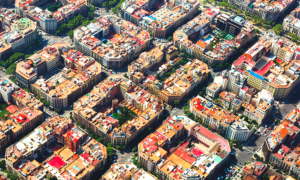National Economy
Spain is the fourteenth largest economy by GDP according to the World Bank with a national net export and import of USD 408,295,800 and USD 317,178.000 respectively, and a negative inflation rate of -0,3%, as of 2016. As one of the country’s most economically developed regions, Catalonia contributes to 14% of national GDP with over 35% of this regional output being produced in the Barcelona area.
Local Economy
Within this context, 89.9% of Barcelona’s economic production comes from services (2015) – mainly retail and commerce, business, communication, and tourism – with the remaining portion being distributed across light/heavy industry and the construction sector.
Following a dip in 2010, local exports volumes has been growing steadily over the last seven years, totaling USD 55,698,846 in 2016 – almost 20% of the national equivalent. The majority of exportations involve the energy sector and industrial products and were mainly directed to the French, German and Italian markets.
On a microeconomic level, median income in the city is estimated at USD 36,962 per household and USD 16,270 per individual (2016); against a national poverty line of USD 8.672 (yearly) per consumption unit. On the other hand, according to regional surveys by the Catalan Institute of Statistics, unemployment rate has been progressively decreasing in Barcelona over the last five years, after reaching a high peak of 23,1% in 2013 as a protracted after-effect of the 2008 global financial crisis. In this respect, although 2017 figures report a total 13,1% unemployment rate, slightly higher among women (12,1% male – 14,1% female), the issue continues to be a matter of concern for social marginalization, according to local authorities.


